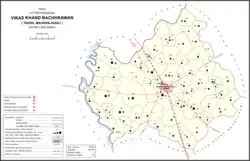Thulendi
Ṭhulendī | |
|---|---|
Village | |
 Map showing Thulendi (#829) in Bachhrawan CD block | |
 Thulendi Location in Uttar Pradesh, India | |
| Coordinates: 26°27′03″N 81°09′03″E / 26.450743°N 81.150716°E[1] | |
| Country India | |
| State | Uttar Pradesh |
| District | Raebareli |
| Area | |
| • Total | 9.30 km2 (3.59 sq mi) |
| Population (2011)[2] | |
| • Total | 6,616 |
| • Density | 710/km2 (1,800/sq mi) |
| Languages | |
| • Official | Hindi |
| Time zone | UTC+5:30 (IST) |
| Vehicle registration | UP-35 |
Thulendi (Devanagari: ठुलेऺदी Ṭhulendī) is a village in Bachhrawan block of Rae Bareli district, Uttar Pradesh, India.[2] It is located 6 km from Bachhrawan, the block headquarters,[3] on an elevated plain with clayey soil.[4] A historic village, Thulendi served as a pargana headquarters from the early 1400s until the late 1700s, and it has several old monuments including a fort built under the Jaunpur Sultanate and two large tanks othat are said to be even older.[4] As of 2011, Thulendi's population is 6,616, in 1,195 households.[2]
Thulendi hosts a fair on the first Friday in Jeth in honour of the 11th-century Muslim folk hero Ghazi Sayyid Salar Masud.[4] Pilgrims bring banners and rest here for one night before proceeding to Satrikh and Bahraich.[4]
History
Thulendi was supposedly founded by a Bhar chieftain named Thula.[4] It was then supposedly conquered from the Bhars by Malik Taj-ud-Din, a companion of the 11th-century Muslim folk hero Ghazi Sayyid Salar Masud.[4] Malik Taj-ud-Din supposedly called the place "Maliknagar" and constructed the two large mud-built tanks in the village (one on the north side and the other on the south) called the "bara hauz" and the "chhota hauz".[4] He was killed by the resurgent Bhars when they retook Thulendi, and his tomb is still extant.[4]
In the early 1400s, Ibrahim Shah of the Jaunpur Sultanate made Thulendi the seat of a pargana.[4] The old mud fort in Thulendi was built in 820 AH, during Ibrahim Shah's reign.[4] Thulendi remained seat of a pargana until the late 1700s, under Asaf-ud-Daula, when the governor Raja Niwaz Singh relocated the headquarters to Bachhrawan.[4] Raja Niwaz Singh built a large haveli in Thulendi that is still standing.[4] He also built a sarai, but it was in ruins by the early 1900s.[4]
At the turn of the 20th century, Thulendi was described as a large village or small town, surrounded by orchards and possessing several sites of historical interest.[4] It had two masonry mosques, five temples of Mahadeo, a large primary school, and a bazar that held markets on Thursdays and Sundays.[4] Its population in 1901 was 2,976, including 944 Muslims; the most prominent Hindu groups were the Pasis, the Brahmins, and the Muraos.[4]
The 1961 census recorded Thulendi as comprising 7 hamlets, with a total population of 2,888 people (1,391 male and 1,497 female), in 624 households and 581 physical houses.[5] The area of the village was given as 2,304 acres and it had a post office at the time.[5]
The 1981 census recorded Thulendi as having a population of 3,968 people, in 870 households, and having an area of 929.97 hectares.[3]
References
- ↑ "GeoNames Search". Archived from the original on 12 April 2014. Retrieved 16 May 2023.
- 1 2 3 4 "Census of India 2011: Uttar Pradesh District Census Handbook - Rae Bareli, Part A (Village and Town Directory)" (PDF). Census 2011 India. pp. 74–90. Retrieved 25 July 2021.
- 1 2 Census 1981 Uttar Pradesh: District Census Handbook Part XIII-A: Village & Town Directory, District Rae Bareli (PDF). 1982. pp. 30–1. Retrieved 28 July 2021.
- 1 2 3 4 5 6 7 8 9 10 11 12 13 14 15 16 Nevill, H.R. (1905). Rai Bareli: A Gazetteer, Being Volume XXXIX Of The District Gazetteers Of The United Provinces Of Agra And Oudh. Allahabad: Government Press. pp. 229–30. Retrieved 28 July 2021.
- 1 2 Census 1961: District Census Handbook, Uttar Pradesh (39 - Raebareli District) (PDF). Lucknow. 1965. pp. x-xi of section "Maharajganj Tahsil". Retrieved 27 July 2021.
{{cite book}}: CS1 maint: location missing publisher (link)